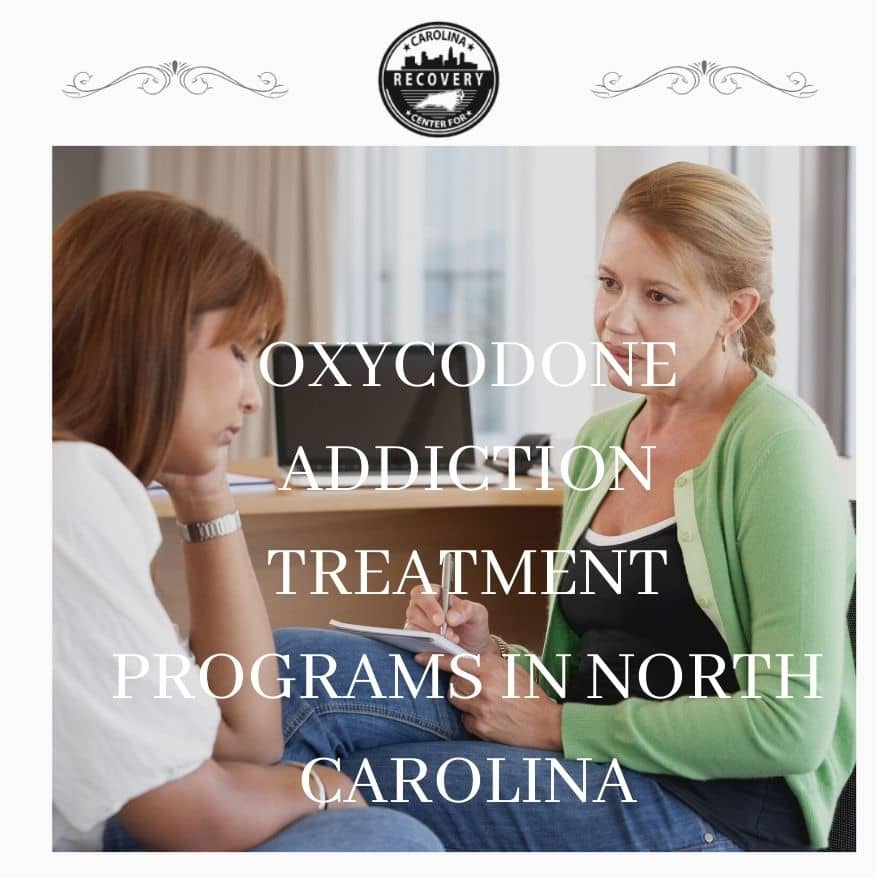Oxycodone Addiction Treatment Programs in North Carolina

Medically Verified: 2/1/24
Medical Reviewer
Chief Editor

All of the information on this page has been reviewed and verified by a certified addiction professional.
The United States is facing an opioid epidemic that has been developing for years. Millions of people live with a devastating addiction to oxycodone and other prescription opioid medications. These common medications are effective at relieving pain but carry the risk of addiction. People who take opioid drugs must understand the risk of addiction and be able to recognize the signs of addiction. Then, they must seek treatment and ongoing support to avoid relapsing.
Contact the Carolina Center for Recovery staff today if you or a loved one require oxycodone rehab in North Carolina.
Understanding Oxycodone Abuse and Addiction
Oxycodone is the active ingredient in commonly-prescribed painkillers like OxyContin, Percodan, and Percocet. Doctors may prescribe medications containing oxycodone to relieve a patient’s moderate to severe pain.
But even under careful medical supervision, oxycodone can be addictive. In addition to relieving pain, oxycodone can also give users a feeling of relaxation, sedation, and euphoria. People may use oxycodone in larger amounts or longer than prescribed because they enjoy these additional effects. With heavy or prolonged use, people can develop physical dependence or addiction to oxycodone.
Oxycodone addiction is a serious and complex condition that can quickly damage a person’s health, relationships, finances, and safety. People who take oxycodone must be aware of the signs of addiction and get treatment to overcome it.
Do I Need Oxycodone Addiction Treatment?
Medical professionals usually only prescribe oxycodone for short-term use. While using drugs that contain oxycodone, people may experience uncomfortable side effects, including:
- Constipation
- Sweating
- Nausea
- Dry mouth
- Confusion
- Hallucinations
For some, the pleasurable aspects of oxycodone may make them want to take it for a longer period or in greater amounts than their medical provider prescribed. Some people may take oxycodone recreationally–meaning, without a prescription–to get these effects.
Some people who use oxycodone may become physically dependent or addicted to it, even if they do not have other risk factors for addiction. Some of the signs of oxycodone addiction include:
- Taking larger doses of oxycodone than a doctor prescribed
- Continuing to take oxycodone longer than recommended
- Needing to take more of the medication to get the desired effects
- Wanting to stop taking oxycodone but feeling like it’s impossible
- Spending a lot of time getting, using, or recovering from using the drug
- Getting into financial or legal trouble because of oxycodone use
- Experiencing withdrawal symptoms without taking oxycodone
People with oxycodone addiction require comprehensive treatment and ongoing support to recover from the condition and learn how to avoid future relapse.
What Happens in Oxycodone Addiction Treatment?
Oxycodone is a complex condition that requires compassionate, comprehensive treatment.
Assessment
Before beginning treatment, a doctor or addiction professional will evaluate your individual needs and recommend a level of care. They will ask questions about your physical and mental health, substance use, treatment history, and other personal information.
Detox
Many people begin oxycodone addiction treatment in a medically-supported detox program. In this type of program, medical and support professionals will monitor and treat your withdrawal symptoms. Treatments include medications, holistic therapies, and emotional support. People in medically-supported detox programs are more likely to have a safe, complete detox than those who attempt to detox alone.
Treatment
After completing detox, you must participate in a comprehensive treatment program designed to address addiction’s physical, emotional, and behavioral aspects. Treatment plans use a combination of evidence-based and holistic therapies to help people overcome addiction and learn the skills they need to avoid relapse in the future.
Therapies include:
- Individual counseling
- Group therapy
- Family therapy
- Medications
- Medical and mental health treatment
- Education
- Holistic treatments like exercise, art therapy, music therapy, and nutrition counseling.
The length of time you spend in oxycodone addiction treatment depends on the length and severity of your addiction and other personal and environmental factors.
Choosing Oxycodone Rehab in North Carolina
There are many facilities that provide oxycodone rehab in North Carolina, and choosing the right one to meet your needs is essential.
The most common types of opioid rehab programs are:
- Inpatient treatment
- Residential care
- Outpatient treatment
- Partial hospitalization programs (PHP)
- Intensive outpatient programs (IOP)
Your doctor or addiction treatment team will evaluate your needs and goals and recommend an appropriate level of care. You must look for a facility that can provide high-quality, comprehensive treatment that can be adapted to your needs and goals.
In each type of oxycodone addiction treatment program, you will receive an individualized treatment plan to help address the root causes of your addiction and give you the skills to avoid relapse in the future.
Find Oxycodone Addiction Treatment in North Carolina Now
At the Carolina Center for Recovery, we believe that with the right support and treatment, recovery from opioid addiction is possible. Reach out to our caring addiction specialists today to learn more about starting an oxycodone addiction treatment program.

